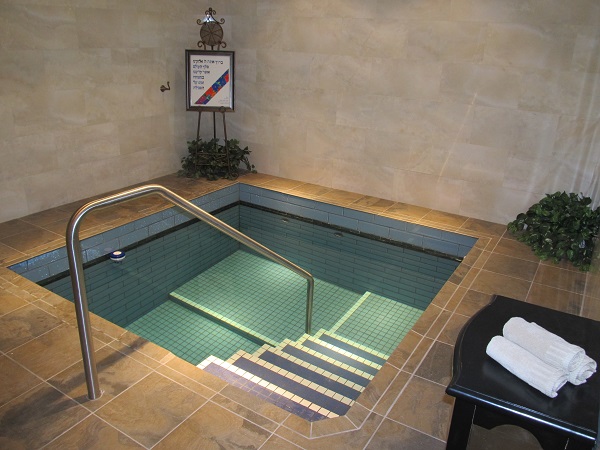By Bart Jones
Newsday
WWR Article Summary (tl;dr) While mikvahs were traditionally used by observant Jewish women to purify themselves seven days after each menstrual cycle; people are going to mikvahs before bar or bat mitzvahs or after difficult experiences such as a divorce or surviving cancer.
Newsday
In Jewish communities across Long Island, interest is growing in an ancient ritual with intricate rules in which women immerse themselves in small, elegant indoor pools.
Known as mikvahs, the pools traditionally are used by observant Jewish women to purify themselves seven days after each menstrual cycle, providing a deeply spiritual experience.
But in a modern update, some are repurposing the mikvahs, also using them to mark a new beginning in their lives after events such as a divorce.
Their use extends beyond the Orthodox community, even to some women who are not particularly religious.
“It is so pristine and so spiritual,” said Chaya Teldon, co-director of the Chabad movement on Long Island. “Some women say it is like a rebirth, like being in the embryonic waters again. It’s your time to talk to God.”
Long Island is home to 13 mikvahs, nearly half of them constructed by the Orthodox Chabad movement in the last decade, Teldon said. They are located in communities including Port Washington, Dix Hills, East Hampton, Great Neck, Cedarhurst and Long Beach.
Chabad has three more under construction in Kings Point, Roslyn and Stony Brook.
In April, the Chabad movement celebrated a “Week of the Jewish Woman” with a series of events that included the grand opening of its newest mikvah in Patchogue. Chabad is an Orthodox, Hasidic Jewish educational and religious organization.
“I always had a dream to have a mikvah in my own community,” said Rabbi Berel Sasonkin, who leads the Chabad of Patchogue. His wife, Chaya, said the mikvah “is the Torah’s way of keeping women respected and valued and cherished.”
All of the mikvahs on Long Island are located within or next to Orthodox synagogues, with the exception of one at the Suffolk Y JCC in Commack, which is run by conservative and reform rabbis, said one of them, Rabbi Howard Buechler of the Dix Hills Jewish Center, a Conservative congregation.
Interest in the mikvahs is growing, even among non-Orthodox Jews and women who do not attend synagogue regularly, said Rabbi Susie Moskowitz of Temple Beth David in Melville, a Reform synagogue.
“For many Jews it has no relevance in their lives because it is associated with more traditional practice,” said Moskowitz, who is affiliated with a mikvah in Commack. But that is changing, as “the experience is being imbued with new meaning.”
People are going to mikvahs before bar or bat mitzvahs, for instance, or after difficult experiences such as a divorce or surviving cancer, as a way to claim their new identity, she said.
“These newer uses, reimagining how this beautiful ancient ritual can speak to us today, is one of the most exciting things happening around the mikvah,” she said.
Many people are attracted to the mikvahs because the experience is so peaceful and transformative — and physical, Moskowitz said.
“There are so few physical experiences we have in religion. A lot of it is cerebral, prayer,” she said. “This is a physical action that has a spiritual element to it.”
Many of the newest mikvahs are luxurious, giving off the feel of a spa complete with piped-in music, a fireplace or a Jacuzzi.
“People are shocked when they see the mikvah,” Teldon said. “Mikvahs today are gorgeous.”
Mikvahs go back thousands of years, and are a “crucial part of Judaism,” said Rabbi Tuvia Teldon, her husband and director of the Chabad movement on Long Island. They exist all over the world, including many ancient ones next to the Western Wall in Jerusalem’s Old City.
Centuries ago, a mikvah was considered so important that a synagogue would sell a Torah scroll to finance its construction.
Traditionally, women are to use the mikvah just before their wedding, after childbirth, and seven days after the end of menstruation.
Mikvahs generally are built in discrete indoor locations, and below ground. They are usually attached to a synagogue, and must contain at least 200 gallons of siphoned rain water that is collected on a rooftop.
buy zovirax generic buy zovirax online no prescription
Women visit them after dusk, alone except for an attendant, and immerse themselves completely in the warm, filtered waters.
“It’s a huge part of my life,” said Gayle Benno, 41, of Merrick, who uses the mikvah at the Chabad Center of Merrick. “It adds a tremendous amount of spirituality and, I feel, blessings to my family and my marriage.”
Benno, who is a member of the Merrick Jewish Centre, a conservative synagogue, said she had never heard of mikvahs until she was in college. She first used one before her wedding 15 years ago, and has visited one regularly for the last dozen years.
Every month it provides a “special time carved out for me,” she said. “I know I have time to talk to God and share all my fears or my hopes or my dreams. It’s like this sacred time.”














































































































































































































































































































































































